#j.d. crowe
Explore tagged Tumblr posts
Text

Rounder 0044
#j.d. crowe#jd crowe#ricky skaggs#tony rice#bobby sloane#jerry douglas#rounder records#rounder 0044#the new south#jd crowe and the new south#bluegrass#newgrass
2 notes
·
View notes
Text
J.D. Crowe & The New South - J.D. Crowe & The New South (1975) … 50 years …

0 notes
Text
TKATB X HEATHERS AU
Crowe- Martha
Sol - J.D
M/C - Veronica
Hyugo - Heather Chandler




#the kid at the back fanart#the kid at the back vn#tkatb vn#tkatb fanart#tkatb sol#tkatb#tkatb crowe#heathers#heathers the musical#veronica sawyer#heather chandler#J.D
60 notes
·
View notes
Text
Stephen Robinson at Public Notice:
Donald Trump is down so bad that his campaign is bringing back Republican dirty tricks from 20 years ago. Kamala Harris is packing arenas and rising in the polls while Trump whines about crowd sizes during incoherent press conferences and in insane Truth Social posts. Harris’s running mate, Tim Walz, is a breakout star — a sharp contrast to Trump’s pick, JD Vance, who can’t shake the notion that he’s a creepy weirdo. Put it together and it shouldn’t come as a surprise that the Trump team is targeting Walz with a sleazy smear campaign that recalls the infamous “swiftboating” attacks against John Kerry. The approach isn’t a coincidence, either: Chris LaCivita, Trump’s senior campaign adviser, coordinated the “swiftboating” smears back in 2004.
Last week, Vance claimed that Walz abandoned his National Guard unit just before it was deployed to Iraq in 2005. “When Tim Walz was asked by his country to go to Iraq, you know what he did? He dropped out of the Army and allowed his unit to go without him,” Vance said during a speech. He’s also accused Walz of exaggerating his record of service. Although the New York Times describes these charges as merely “provocative,” they’re actually repulsive lies. Walz retired from the National Guard after 24 of years of service. He put in his request months prior to the unit’s deployment, but Vance suggests Walz was asked to go to Iraq and he quit in response. Meanwhile, other equally shameless Republicans, including former Army officer Tom Cotton, pushed the false narrative that Walz callously ditched his unit to pursue a political career. “JDVance is right,” Cotton posted on X. “Tim Walz’s unit got orders to Iraq. He could’ve gone with them, but didn’t. He let his troops go to war without him instead.”
Here are the facts: Walz joined the Nebraska National Guard in 1981, two days after his 17th birthday. He was eligible for retirement after 20 years of service in 2001 but re-enlisted after 9/11, according to an interview he did for a Library of Congress oral history project. Walz officially launched his congressional campaign in February 2005, more than a month before the National Guard announced the possible partial mobilization of 2,000 troops. His last day with the Guard was May 16, 2005, and his unit received its official deployment orders on July 14.
Yes, Walz has stated in an interview that he “decided to retire to focus full time on running,” but he was 41 years old with a 4-year-old daughter. During an appearance on The Bulwark podcast, former GOP Rep. Adam Kinzinger, an Iraq War vet, pointed out that Walz already did what 99 percent of Americans don’t — willingly volunteer for service — and there’s nothing dishonorable about retiring. If Walz’s retirement would’ve compromised the unit, the military could have issued a stop-loss blocking his request. That didn’t happen. In addition to the swiftboat-style smears, Republicans have accused Walz of “stolen valor” for past remarks that suggested he served in active combat.
[...]
The origins of “swiftboating”
Unlike President George W. Bush, Kerry served in Vietnam and spent several months commanding a patrol craft called a “swift boat.” He was injured three times in the line of duty, including getting hit by a piece of shrapnel that remained in his thigh when he was on the campaign trail in 2004. Despite Kerry’s decorated service, the Swift Boat Veterans for Truth (SBVT) was a right-wing political organization that formed in direct opposition to his presidential candidacy. The group financed the book “Unfit for Command” and released a series of ads that attacked Kerry’s service and questioned his military honors, including his three Purple Hearts. Delegates at the 2004 Republican National Convention sunk so low as to mockingly wear adhesive bandages with small purple hearts on their chins, cheeks, and backs of their hands — suggesting that the injuries Kerry received during the war were a joke.
Backed with money from Clarence Thomas’s billionaire buddy Harlan Crow, LaCivita rounded up right-wing veterans willing to trash Kerry’s service, often in direct contradiction to statements made prior to his presidential run. George Elliott, Kerry's former commanding officer, had previously praised Kerry’s combat performance and stated in June 2003 that his Silver Star medal was “well-deserved.” But after Kerry formally announced his candidacy, Elliott — now a member of SBVT — released an affidavit in June 2004 claiming that Kerry “lied about what occurred in Vietnam,” which he later retracted, as well as another affidavit in September 2004 claiming “had I known the facts, I would not have recommended Kerry for the Silver Star.”
[...]
Why it won’t work this time
With Iraq being a major political liability for Bush, Kerry centered his campaign around his military service. He began his DNC acceptance speech with the line, “I’m John Kerry, and I’m reporting for duty.” A decorated veteran as the Democratic nominee was intended to challenge the perception that the party was “soft” on defense, particularly during a time of war. The “swiftboating” smear leveled the foundation of Kerry’s pitch to voters. He’d supported the disastrous Iraq War, so the rationale for his candidacy was that he’d make a superior commander in chief to Bush. But with his service record in question, he was less able to draw the intended contrast. Kerry enjoyed a narrow lead in the polls for most of the summer, but it evaporated shortly after the swift boat smears began and he went on to narrowly lose to Bush in November. (It’s still the last time a Democratic presidential candidate lost the popular vote.)
Walz, however, is not at the top of the ticket, and his appeal extends far beyond his military service. Arizona voters may still describe Sen. Mark Kelly as a “former astronaut,” but Walz is seen as a former high school football coach and longtime congressman. Harris/Walz supporters hold up signs at rallies that state simply “COACH,” and Harris promotes that image by regularly using the term to refer to her running mate. Walz even concludes his stump speech with what feels like a motivational locker room pep talk. These attacks on Walz’s military record aren’t new, either. When Walz ran for governor in 2018, two retired command sergeant majors in the Minnesota National Guard, Thomas Behrends and Paul Herr, submitted a paid letter to the editor at the West Central Tribune that accused Walz of “conveniently retiring a year before his battalion was deployed to Iraq.” But these allegations don’t hold water for anyone who has bothered to look into the timeline of his service. The Kerry campaign avoided a direct response to the attacks for far too long, which is rightly considered a mistake. Democrats learned a hard lesson from “swiftboating” — don’t assume that voters will see through the GOP’s transparent lies. So this time around, the Harris campaign and its surrogates moved swiftly to counter the charges.
The Trumpists are launching desperate smears against Kamala Harris VP pick Tim Walz’s military service record to pull a Swift Boat 2.0.
#Tim Walz#J.D. Vance#Donald Trump#2024 Elections#2024 Presidential Election#US Military#National Guard#John Kerry#Chris LaCivita#Kamala Harris#Swift Boat Veterans For Truth#Harlan Crow#Minnesota#Minnesota National Guard
29 notes
·
View notes
Text

J.D. Crowe
* * * *
More on Qatar’s gift of a 747-8 to Trump
Two additional comments on the corrupt offer of Qatar to give Donald Trump a Boeing 747-8 for his personal use.
First, Josh Marshall of Talking Points Memo discusses the fact that it would be difficult, if not impossible, to update the aircraft to the security standards of Air Force One. The secure communications and defenses would take years to install—meaning that the plane would be ready for delivery after Trump is out of office. At that point, it would be his personal plane. See Talking Points Memo, Don’t Get Conned By Trump’s Air Force One Boondoggle.
Second, Adam Schiff produced an explainer video on the scandal. See The Schiff Notes, Plane-ly Corrupt, by Sen. Adam Schiff. The video is interesting because it includes photos of the plane's interior and explains that the gift of the plane is only one way in which Qatar is enriching the Trump family. It is worth ten minutes of your time to watch.
Yesterday, I explained the legal and constitutional bases that prohibit the gift to Trump from Qatar. While informative, that message is too complicated. Most voters do not care about “the Foreign Emoluments Clause.” They care that they can’t get an appointment until next September to be seen about a heart condition, while Trump is riding in a “Flying Palace.”
Remember and repeat: Flying Palace.
[Robert B. Hubbell]
#J.D.Crowe#J.D.Vance#Robert B. Hubbell#Robert b. Hubbell newsletter#flying palace#corruption#bribery#mafia#Qatar
45 notes
·
View notes
Note
Hey, amazing work you are doing <3
This is not a question, but thought I wanted to share this with everyone ^^
As someone who loves to read different kind of books and is always ready for recommendations, I was excited for the books being organized alphabetically in s2ep2. And since there was an X-ray of saying "... Would love for everyone to read these books..."
And I had way too much time so here is the list of those books:
No Woman, No Cry - Rita Marley
The Crow Road - Iain Banks
The curious incident of the dog in the night-time - Mark Haddon
Catch -22 - Joseph Heller
Love in the Time of Cholera - Garriet Garcia Marquez
Nineteen eighty four - Orwell George
The Big Sleep - Raymond Chandler
The Bible
The Great Gatsby -F. Scott Fitzgerald
The catcher in the Rye - J.D. Salinger
A Series of Unfortunate Events - Lemony Snicket
Herzog - Saul Bellow
I know I missed one or two, but those are at least there.
Hiya! :) Thank you, made a thing: :) (Added A Tale of Two Cities by Charles Dickens, I Capture the Castle by Dodie Smith and The Bell Jar by Sylvia Plath :)<3)
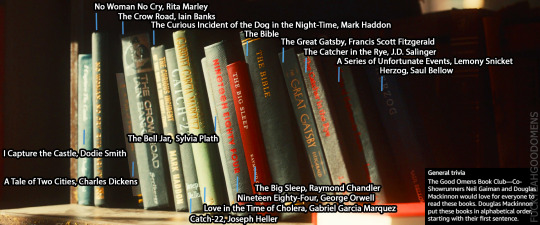
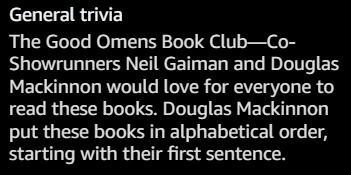
641 notes
·
View notes
Text

Y:... everything is fine but....why is John wearing a fairy girl costume?
L: I promised everyone I would do anything they wanted to get them to come here! Crow wanted money, Vex wanted a new pillowcase and John-
J.D: Fairy costume because it looks so cute!
Y:....damn you all!
#lavina-arts#my post#shitpost#fanart#art#my art#my ocs#john doe game#john doe#brawl stars crow#brawl stars#league of legends vex#league of legends
26 notes
·
View notes
Text

Dark Night of the Scarecrow and Dark Night of the Scarecrow 2 will be released together on 4K Ultra HD and Blu-ray on September 10 via VCI Entertainment.
Dark Night of the Scarecrow is a 1981 made-for-TV horror movie directed by Frank De Felitta and written by J.D. Feigelson. Larry Drake, Charles Durning, Tonya Crowe, Jocelyn Brando, and Lane Smith.
Dark Night of the Scarecrow 2 is a 2022 sequel written and directed by J.D. Feigelson. Amber Wedding, Aiden Shurr, Carol Dines, Adam Snyder, and Tim Gooch star.
Special features are listed below.
Special features:
Dark Night of the Scarecrow audio commentary by writer J.D. Feigelson (new)
Dark Night of the Scarecrow audio commentary by film historians Heath Holland, Robert Kell, and Amanda Reyes (new)
Dark Night of the Scarecrow audio commentary by director Frank DeFelitta and writer J.D. Feigelson
Bubba Didn't Do It: 30 Years of the Scarecrow featurette
Dark Night of the Scarecrow cast reunion Q&A at Frightfest 2011
1981 CBS world premier promo
1985 CBS re-broadcast promo
Photo gallery
youtube
Dark Night of the Scarecrow tells of the murder of a young girl, Marylee Williams (Tonya Crowe), and the vicious mob justice wrongly enacted on Marylee’s innocent, mentally challenged friend Bubba Ritter (Larry Drake). A cover-up by the murderous mob, led by Otis P. Hazelrigg (Charles Durning), results in a strange turn of events. Soon, one by one, the guilty are stalked and served a specific kind of justice by an unknown figure.
youtube
40 years in the making, Dark Night of the Scarecrow 2 picks up with Chris (Amber Wedding) and her young son Jeremy (Aiden Shurr), moving to the small town where the events of the first film took place. Chris finds a tattered scarecrow amongst the cornfields of her new home and tells the effigy her secret; the real reason she has come to this small town. Soon after, a mysterious figure begins to roam the fields of their new home… stalking them or protecting them from unknown threats?
Pre-order Dark Night of the Scarecrows 1 & 2.
#dark night of the scarecrow#horror#80s horror#1980s horror#dark night of the scarecrow 2#vci#dvd#gift#made for tv movie#tv movie#larry drake#charles durning#lane smith#80s movies#1980s movies#Youtube
21 notes
·
View notes
Note
hello! We’re requesting again since we really enjoy your guys templates! Could we get a Veronica Sawyer (Heathers: The Musical) themed intro, with these specific emojis?: 💙🌀🌐, please don’t rush yourselves, and we hope you all have a good day! -Earth, Veronica Sawyer, J.D. (These are two amazing people to have in front rn, /sarc)
But anyways, Have a good day, make sure you eat and sleep well! -Earth
⌞ ⇠ ⌜🌐⌝ ⇢ ⌟
║💙 name:
║🌀 age:
║🌐 pronouns:
║💙 gender:
║🌀 orientation:
✧✦ 🌀 ✦✧
║🌐 role:
║💙 sign off:
║🌀 subsys/group:
✧✦ 🌀 ✦✧
║🌐 flirting:
║💙 nicknames:
║🌀 pet names:
║🌐 touch:
║💙 status:
║🌀 family:
║🌐 other info:
⌞ ⇠ ⌜🌐⌝ ⇢ ⌟
||template by crows-templets on tumblr||
Here ya go!
You have a good day as well!
#endos dni#did#did osdd#system#traumagenic system#osddid#plural kit#simply plural#request#plural kit intro#simply plural intro#alter intro template#dni radqueer#crows templets
8 notes
·
View notes
Text

Jerry Douglas, Ricky Skaggs, J.D. Crowe, Bobby Slone, & Tony Rice perform at the Bicentennial Folk Music Festival and Revival, Escoheag, RI, 1975. Photo by Phil Zimmerman.
#jerry douglas#ricky skaggs#jd crowe#bobby slone#tony rice#the new south#escoheag#rhode island#phil zimmerman#bluegrass#bicentennial folk music festival and revival
6 notes
·
View notes
Video
youtube
1994 REUNION OF TONY RICE & J.D. CROWE in LEXINGTON, KY - FAREWELL BLUES
5 notes
·
View notes
Text
get to know me!
hello! my old get to know me is pretty outdated, so i thought i'd write a new one!
my name's crow, i'm 21 and i currently live in the midwest, usa. i use any pronouns but i currently prefer she/her. i've been in fandom for about 10 years now, but i'm still fairly new to tumblr.
i love to write and i'm slowly getting back into fanfiction. i also love to read, crochet, and play video games. i'm currently learning french, and i hope to post sometimes in the language.
my special interests:
shows:
yellowjackets ☆
supernatural ☆
the walking dead
house m.d.
you
games:
minecraft
the sims 4 ☆
stardew valley
schedule 1 ☆
valorant
overwatch
mouthwashing
writers/books:
kurt vonnegut ☆
j.d. salinger ☆
james baldwin
the virgin suicides | jeffrey eugenides
the stranger | albert camus
shirley jackson
no longer human | osamu dazai
music:
chappell roan ☆
twenty one pilots ☆
sabrina carpenter
will wood ☆
sir chloe
kendrick lamar
i know this list is super duper long but i have so many interests and i hope to meet a lot of new people!
#intro post#introductory post#introduction#introducing myself#pinned post#pinned intro#meet the blogger#finding mutuals#new mutuals#mutuals#looking for moots
4 notes
·
View notes
Text
No Woman No Cry by Rita Marley with Hettie Jones
What could a memoir by Rita Marley, widow of Bob Marley, one of the most internationally renowned musicians of all time, possibly have to do with Good Omens? This is what I was wondering when I saw it on the "book club" list in Amazon's X-Ray feature, and what I was determined to find out by requesting it from the library.
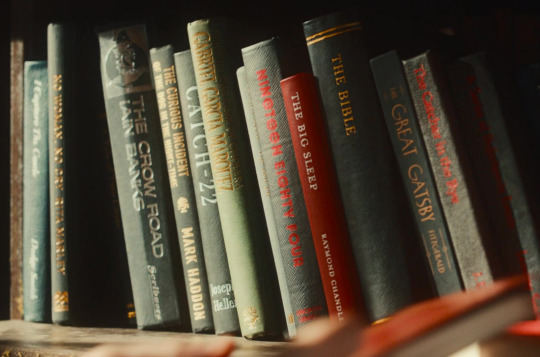
[ID: A screen capture from Good Omens Season 2 Episode 2: several books on Aziraphale's bookshop shelf. From left to right, the legible titles are: I Capture the Castle by Dodie Smith; No Woman, No Cry by Rita Marley; The Crow Road by Iain Banks; The Curious Incident of the Dog in the Night-Time by Mark Haddon; Catch-22 by Joseph Heller; Love in the Time of Cholera by Gabriel García Márquez; Nineteen Eighty-Four by George Orwell; The Big Sleep by Raymond Chandler; The Bible; The Great Gatsby by F. Scott Fitzgerald; The Catcher in the Rye by J.D. Salinger; A Series of Unfortunate Events by Lemony Snicket; Herzog by Saul Bellow. There are a few other books, but their titles can't be seen in the screen capture. At the bottom of the frame are Gabriel's blurred fingers as he removes another book from the shelf. End ID]
Screen capture is from cap-that.com.
As a nonfiction narrative about real people, some of whom are still alive, No Woman No Cry is different from all the other books on the list. It's got intimate details about real people's lives and major historical events, and that is why I'm not going to make one-to-one comparisons to my favorite fictional story.
But I will write a summary and a reflection on it.
Warning for the summary and essay below about racism, colonialism, rape, and spousal abuse. Do feel free to chat or ask me about more specifics, if you're concerned about reading those subjects. Also, though it's a memoir rather than fiction, there are, of course, many spoilers.
So, first of all: I am in so very far over my head when it comes to discussing the deeper themes of this book. I grew up a middle-class white girl in Connecticut, USA in the 1990s and 2000s and experienced neither abuse nor fame in early adulthood; this memoir is written by a woman who grew up a dark-skinned black girl in deep poverty in Jamaica in the middle of the twentieth century, then experienced a dizzying combination of fame and abuse almost all at once. I can empathize with Rita's story as she tells it, but to analyze and extrapolate in any sort of insightful way? No, I don't think I can do that. No Woman No Cry deserves reflection, though. Please kindly bear with a little clumsiness.
I can see from online discussion that a lot of people come out of this book feeling shocked and dismayed to discover that Bob Marley did, indeed, abuse his wife, including an instance she described as "almost rape" when he simply would not accept a sexual rejection. After writing about all this and more, though, Rita Marley continues to miss, love, and admire Bob; per the online comments, many readers seem to have decided that she is misguided, afflicted, or outright delusional for feeling this way. Although I could not forgive Bob's abuses, I also cannot dismiss the positive meanings that Rita has taken from her time with Bob. It's her story, not mine, and she already has her own way of synthesizing the good, the bad, and the ugly.
Summary
No Woman No Cry starts with Rita Marley recalling Bob Marley's death.
But then I started to cry and said, "Bob, please, don't leave me." And he looked up and said, "Leave you, go where? What are you crying for? Forget crying, Rita. Just keep singing. Sing! Sing!" So I kept singing, and then I realized, wow, that's exactly what the song was saying: "I will never leave you, wherever you are I will be..."
Rita Marley's full maiden name was Alfarita Constantia Anderson, but she went by Rita her whole life. Her parents separated, as was common, and she lived with her beloved Aunty Viola for much of her youth. Rita was bullied by her classmates for her dark skin; though most Jamaicans are people of color, eurocentric beauty standards brought in by colonialism still led to a strong bias toward lighter skin.
Rita met Bob Marley in Trench Town when they were both getting into music; Rita was in a group called The Soulettes, and Bob was in a group called The Wailers with his friends Peter and Bunny. They bonded over music. They also bonded over Bob's generosity with Aunty and taking care of Rita's child, as Rita was a single mother at the time and Bob was nurturing toward her baby daughter, Sharon. Interestingly, Rita stated she initially got involved in Bob's personal life because she felt she wanted to take care of him, as he didn't have anywhere comfortable to live.
Bob got Rita interested in Rastafari, which connected with her spiritually and helped her gain confidence in her beauty and worth as a black woman. Rita gives Bob a great deal of credit throughout the narrative for helping her discover herself.
Rita and Bob had very little income for the early part of their marriage. They had to stay in a single room at Aunty's house, and although they loved Aunty, it was just too crowded, especially since Aunty and Rita's brother did not approve of all of their decisions. They were judgmental of Rastafari, for example, which had no respect in Jamaica. (Although there is still bias against Rastafarians today, things are a bit better.)
Over the next several years, Rita and Bob moved a few times while continuing to work on Bob's music; they had homes in Nine Mile and then again in Kingston. Rita describes the two of them getting into "love fights" and then making up; they would fight "like children," as she put it, although she was left with physical injuries at times. Aunty warned Rita against staying with a spouse who would hit her. Rita, however, didn't want to leave, partly out of love and partly because she felt that maintaining the marriage was a duty. She also believed she and Bob would always actively choose to be friends, no matter what happened. Bob made up with both Rita and Aunty.
Rita considered different career paths, which included some music, but also the possibility of nursing. On the other hand, Bob devoted himself entirely to music, except for a short time working in the United States. Both Bob and Rita worked in the United States at different times. Neither of them liked it. During Rita's stay in the US, she hated being away from home and felt like she was growing apart from Bob. When Rita got back to Jamaica, she discovered that two other women were pregnant with Bob's children. Though she was angry, Rita decided that because of her spirituality and her continued love, she would remain married to Bob, but would focus on taking care of herself and the children. By now, the family had three children: Shannon (who Rita had before meeting Bob and who Bob formally adopted), Cedella, and David Nesta (better known as Ziggy).
This whole time, Bob had been working on music, with Rita helping when she wasn't away in the US. They had been establishing relationships with studios and selling records, and were seeing some success.
Bob and the Wailers' new producer gave them a house as a space to work and make music. That house was at 56 Hope Road in Kingston, and it's still a famous site today. By the time they got that house, Bob was entirely the one performing with the Wailers, while Rita was mostly taking care of the children. Because of the constant activity from strangers, business dealings, and womanizing that went on at Hope Road, Rita did not want to raise her children there, and she decided to get a government-sponsored house in Bull Bay, another city.
Bob ultimately bought the house in Bull Bay at Rita's request. Rita worked hard on developing her independence while she was raising the children there; she learned to drive and garden, and the garden yielded many fruits and vegetables. Aunty and other friends helped out, too.
Bob financially supported Rita and the children. He divided his time between the house in Bull Bay, the house at 56 Hope Road in Kingston, and tours. Rita and Bob's relationship seemed to be somewhat fluid here; on one hand, Rita describes herself as a "friend" or "sister," and she strongly contemplated divorce. But she also describes how she got a basement studio at the Bull Bay home, and how she and Bob would go down there to make out sometimes, or, more often, to make music. Sometimes, they'd even have little family "events" in that basement studio wherein the children, who were now a bit older and had strong interests in music themselves, could put on imaginary little shows for fun.
Although Bob constantly had girlfriends, he got inordinately jealous of Rita's friend and neighbor, Owen Stewart, known as Tacky. Tacky was not initially a romantic interest. However, Bob assumed he was. One night, Rita informed Bob that she didn't want to have sex anymore because of his constant philandering; she wanted to take a stand. But he was absolutely insistent, arguing that he should be able to have sex with her because she was his wife, until she finally went along with him. Rita comments, "I was almost raped that night."
It sounds like it was rape to me. And Rita got pregnant from it. She and Bob now had another son, Stephen.
Rita and Tacky had by then started having a sexual relationship, which Bob tried to confront Tacky about. One of Bob's girlfriends just happened to appear right while he was talking to Tacky, which was a massive embarrassment and which Tacky correctly used to point out Bob's hypocrisy. Bob stopped arguing, and Rita continued her relationship with Tacky. Rita also had a child with Tacky, a daughter named Stephanie, who Bob adopted.
Life, incredibly, moved on, and Rita suggested to Bob that she should start a juice bar with some of her produce at his Hope Road studio location. Bob agreed, and Rita started the stand that eventually became the Queen of Sheba restaurant. Everyone loved her organic food; Rita comments that Bob was her best customer and PR man.
While running the Queen of Sheba restaurant, Rita reconnected with some friends: Minnie, Judy, and Marcia. Minnie helped a great deal with the restaurant. Rita, Minnie, and Judy wanted to start a Rastafarian women's organization and school for Rastafarian children, while Rita, Judy, and Marcia agreed to sing together at a club. It was Rita's first public performance in a long time.
Right after this, The Wailers broke up. Specifically, Bob signed on again with the same record label and would still work with new singers as "Bob Marley and the Wailers," but the other Wailers, Peter and Bunny, left. They weren't happy with the way the label was headlining Bob. Bob felt deeply hurt by the group's dissolution, but he asked Rita, Marcia, and Judy to come sing backup with him in the studio and on tour.
Bob was paying Rita, as well as Marcia and Judy. But at the same time, Rita got to make music with Bob again, and she loved that. She was very happy to go on tour with him, partly out of a desire to spend time together again - through all the horrible things that had happened, they still loved each other and wanted to spend time together. Rita was also happy to be working on her own musical career. Rita, Marcia, and Judy had named their trio the I-Three, and this would be solid work for all of them.
Rita insisted on getting to be her own separate person on tour, a member of the I-Three instead of Mrs. Marley. She writes about wanting to continue looking after Bob on the road - ensuring his laundry was done and meals were eaten, for example. But otherwise, she stated, she was free to do whatever she wanted on the road in a way she couldn't be at home and wouldn't have been if she were expected to be acting as Mrs. Marley the whole entire time. She also, however, writes about missing her children and her home dearly.
Again, Bob and Rita's relationship continued to seem very fluid. Bob would get jealous if he thought other men were involved with Rita; there was even an incident when he came into her hotel room, started shouting when he saw a male friend in there, lifted Rita up off the bed, and dropped her back on the bed. But he also continued to have affairs and children with other women. Rita writes that she wasn't threatened by many of these women because there were so many of them and they didn't represent serious relationships. Rita also felt it was easier to just take Bob's children by other women into her home, and she often had friendships with their mothers. There were a few women who seemed serious enough for Rita to be hurt by their presence, but over and over again, she chose not to worry about it, because she viewed her role as more important.
Despite the difficulties of dealing with Bob's womanizing and being away from home, Rita chose to stay on tour for all those years because she was instrumental in holding together "such a good thing" - Bob's musical tours with the I-Three - and she sensed it was important to people all over the world. She also loved the sense of individual development she got from that time. Rita comments:
Take your troubles to the Lord and not to the people, I'd tell myself. So I did just that---I prayed. And I gave my part, I gave it honestly. I gave my part, from the heart, and I was paid for it. Paid every week, just like everybody else. So I could maintain myself, not just physically, but with a lot of spirit. And on good days, even though I wasn't altogether happy, I felt so independent, thinking, well, now I can do whatever I want, now I can buy clothes and shoes that I like, I can be---whew---just what I wanna be!
During the seven years they were touring (interspersed with time at home in Jamaica), Bob and Rita did have their arguments and fights, but they overall got along well and were still in love, so they solidified their relationship "as man and wife" again.
However, Rita still didn't feel individuated in the way she wanted to, so she signed with a record company named Hansa Music. Bob did not like this because he wanted to be the one to give Rita her big break; he wanted to keep the music in the family. He felt like white people (Hansa Music was a French company) were taking Rita away. But Rita and the record company were persistent, and he finally agreed to cooperate. Rita started working on her own individual music.
Bob had a political presence - people had come to think of him as "the voice of the people," and youth from the ghetto tended to look to him for help. People would come to Hope Road looking for favors and financial help, with which Bob was generous. But a lot of the people looking for help were mixed up with crime. He became anxious, even paranoid, as people sought help with matters that could endanger Bob and the family - people asking to stay at Hope Road to avoid gang violence, for example.
Eventually, the government asked Bob to do a peace concert called "Smile Jamaica" to encourage peace in the population before an election. Bob agreed, because he believed in peace.
Just after a rehearsal shortly before the concert, Bob and Rita were shot in an assassination attempt; Rita was shot in the head but the bullet didn't cause a fatal wound because of her thick dreadlocks, and Bob was grazed across the chest and shot in the elbow, where the bullet remained for the rest of his life.
Bob insisted on doing the concert anyway, with the bullet in his arm. Rita was up there with him, even though they hadn't been able to remove the bullet from her head yet, either.
After the assassination attempt, the shaken family spent some time in the Bahamas, in Nassau. Bob then went "into exile" in England, where he reconnected with one of his girlfriends. Rita and the children went back to Jamaica for school, but no longer felt safe in their Bull Bay home, so Bob bought a three-sister (three-family) house for them in Kingston. Rita and Bob continued to talk almost every day by telephone.
The political situation didn't lighten up - Bob's influence was being tracked in the United States, and this included intelligence agencies monitoring his mail - but he decided to return to Jamaica after about half a year because he missed his home. However, Bob returned to increased political activity, including more people asking for dangerous favors; again, gang members asked to stay in his home and wanted to act as his personal security.
Before what would be their last tour, Rita wanted to get a different house for the children. She and Bob disagreed on the house; Rita wanted a smaller but beautiful house on a hill overlooking Kingston, while Bob had plans to build a mansion he could settle into with all of his children and work on his music. Rita realized Bob was planning much more for himself and the children than for her, even though he also made a bunch of promises about being a better father, friend, and husband after this tour. He was planning to settle down. Rita told him that was nice, but still decided to put her advance from the tour toward the house on the hill.
During this next tour, Bob injured one of his big toes twice, first in 1975 - after which point it never fully healed because Bob would not give it a rest - and then again in 1977, after which the nail fell out and he developed malignant melanoma. He was advised to have the toe amputated. However, he refused, believing he couldn't perform without his big toe, that audiences wouldn't want to see that, and he was told the doctors were lying. He believed the doctors were lying.
They proceeded with the tour. Bob was extremely famous at this point, and Rita felt she was losing him; other people controlled all his time and influenced his every decision, and Bob felt obligated to keep up with all the demands, even at the expense of his own health. Eventually, Bob collapsed and was taken to the hospital, at which point he discovered his cancer had spread to his brain and he had only months to live. Because the diagnosis was terminal, Bob's managers were planning to keep him touring until he died, but Rita was outraged about this and called everyone she knew to insist on bringing the tour to a stop.
Bob did get cancer treatment, first in the US and then with a specialist in Germany. The German doctor, Dr. Josef Issels, managed to keep Bob alive six months longer than the other doctors believed was possible; however, he soon died very young, at the age of 36.
Rita was devastated. As they were both young, Bob's death was the first major loss Rita had experienced.
Moreover, Rita was immediately thrown into managing a ton of issues that had never been planned for. Rita was betrayed and taken advantage of by people who had been involved in managing Bob's finances, and she even ended up on trial because they accused her of misusing Bob's money after his death. However, everything Rita had used the estate's money for was legitimate. She acted according to the financial advice of his manager, and took care of the children, and paid for his funeral, and paid legal fees. Bob also simply was not as wealthy as people believed; his legacy has generated a lot of money over decades, indeed, but at the time of his death, he wasn't inordinately wealthy, or he wouldn't have felt so much pressure to do all that touring.
Summing up their relationship after Bob's death, Rita writes:
I thought Bob did the greatest thing by leading me to find myself. ... 'You are what you are, you are black and you are beautiful.' And I know there are many, many others who learned that same lesson from him.
Rita went on to carry Bob's legacy forward, keeping his music alive. In 2000, Time magazine awarded the "Song of the Century" title to Bob's song "One Love" and the "Album of the Century" title to Bob's album "Exodus." Bob's children now have musical careers, which Rita has nurtured.
Rita was able to set Aunty up, eventually, with everything she wanted, and Rita's father came home to spend time with his many grandchildren. Eventually they both passed away, and as keenly as she felt the losses, Rita was able to lean on her friends. Rita also had one more daughter named Serita with Tacky.
Over the past few decades, Rita has continued to pursue her dreams and live an incredibly active life. She has continued to promote Bob's music, but also moved to Ghana and started a nonprofit called The Rita Marley Foundation, caring for infants and the elderly. She has done a great deal of humanitarian work.
Worth noting that Rita structured this book so it ended with the same idea with which it started:
So I started to sing, as he told me to do, and just as he said it would be, everything was all right. Rastafari!
The Big Picture
The way I see it, a big part of No Woman No Cry is about identity and individual will. The concept of identity is in the ways we're defined by our connections, from intimate connections to large-scale social contexts, and in the ways we're defined by our own choices. It hit me with almost every chapter how strong Rita's individual will was while at the same time being interconnected and interdependent with so many other people in her life, and, of course, being shaped by her race and Jamaica's status as a colonized nation until 1962.
This book is also a study in the complexity of human connections - particularly, in how it is possible to meld hopes and dreams with another person's, and to unreservedly lean on other people, without losing one's sense of self. Rita and Bob chose to marry because they had mutual dreams; Rita chose to stay with Bob, though, because of the way she personally wanted to live. And she simultaneously pushed for her independence, which in the end was the thing that allowed her to do so much of her own humanitarian work and carry on Bob's legacy, too.
This pattern, wherein individual will and relationship connections mutually strengthened each other, carried out with all of Rita's close friends and loved ones. I'm thinking especially of Aunty - Rita and Aunty clashed a great deal in Rita's youth, and yet, each valued their family connection as much as their own individual will. They stuck together despite the friction; Aunty helped raise the children, and later, Rita was able to provide Aunty with a comfortable life. That in turn was possible only because of Rita's insistence on making her own choices while Aunty insisted on continuing to provide support.
Hand-in-hand with the concept of identity is memory. This is, after all, a memoir. Its very purpose is to solidify memories, to put them in the form of a book and to help other people understand Rita's life with Bob. When Rita explains her motivations in writing, she's giving her individual will, her choices, a material presence in the world. Although I don't believe Rita comments on this in the book, I'm imagining that the act of putting her memoir in writing helps solidify her power over the narrative of her life; by writing out our stories and the thoughts that inform them, we can illuminate the power our own choices have.
Another theme running strong throughout No Woman No Cry is faith. In high contrast to the themes of The Crow Road, Rita Marley's faith doesn't hold her back; it gives her strength and connects her to others. "Faith" for Rita means Rastafari. It helped her connect with her inherent worth as a black woman, and it helped her see her own success as part of a better world overall. Rita shores up her faith against the oppressive, authoritarian nature of colonialism. For Rita, faith isn't something that subdues her with dreams of another world; it's something that moves her to act in this one.
The book opens and closes with assurances that Rita should just keep moving forward (singing, in her case) and everything will be all right. That's also faith - the belief that she will succeed if she just presses forward, even if she's not sure how that can happen. Her spirituality allows her to tap into this, but it isn't specific to a particular belief system. It's just about being willing to believe, time and time again, that one foot in front of the other will ultimately lead somewhere good.
Altogether, I believe No Woman No Cry was on the Good Omens book club list because No Woman No Cry centers the depth of the human experience: the things that make us who we are, the ways we connect with other people, and how we can figure out where we belong.
8 notes
·
View notes
Note
13, 15, 16, 19 for RE meme
Thanks for the ask :)))
13. Favorite & least favorite character in Retribution?
This the hardest film for me to choose :'( Definitely predictable coming from me, but I'm gonna say Bad Rain is my favorite. I do really, really love Good Rain too, though. And Becky. And Luther. And Jill. And Ad—you get the point.
Sure, Bad Rain is supposedly just an evil Umbrella drone, but I'm charmed by the toothy grins she flashes. She's looking all self-satisfied when she cracks Alice's ribcage with that open palm strike, cocky when she kicks her across the snow and declares she can't kill her, and weirdly amused in the Control Room when observing how Ada killed everyone assassination style. She is simply a bastard <3 I am mad at her for killing Luther, though.
My least favorite? Leon. Did you know that in the original draft for Retribution, Leon was an original character? Should've kept it that way imo. I'm not mad that he isn't like his game counterpart (who I do like), I just cannot find it in me to care about him. Maybe if he was established in an earlier film I would? He and Alice has this weird thing where they clearly dislike each other in a way that feels like they met before, but we never get to see that so it's kinda out of nowhere. I care about Tony more than Leon in Retribution.
15. Unpopular opinion?
If I have any, I'm not entirely sure what they are...
I do see a lot of people call Retribution the worst film, but it's my favorite after the first one. The fight scenes are fun, I love seeing the clones (I would've killed for Martin Crewes and Pasquale Aleardi to return, too), I love nearly all the characters, the Las Plagas Undead are silly, it's all ridiculous, it's fun.
16. An underrated character?
I'll pick Betty this time. Of course the character with medical expertise has to die the minute things get serious in a movie like this (RIP Olga. I like her too), but she does has a good death. She locked herself in the bus with those crows so other survivors could get to safety! She took out as many as she could before they killed her! Plus, she's a sweetheart. I wanna see her in more Extinction stuff.
19. Pairings you dislike?
While I'm not opposed to writing Rain as having some level of interest in men, I can never ship her and J.D. romantically. They are best friends to me. I also feel like Rain has a past of being one of/the only woman in her teams and getting shit for it. She'd be underestimated, called a bitch for responding negatively/rudely when receiving unwanted comments about her appearance, etc. Then she met J.D. J.D. was a cocky asshat at first and they didn't like each other much. He said he doubted some of her skills, but he was that with everybody, and when Rain put him in his place, he sucked it up and admitted she was better with a gun.
J.D. is competitive with her in a way she likes. He teases her in a way she might still roll her eyes at but doesn't find genuinely annoying. He's the first person she's gotten close enough with to consider a best friend. That's it.
I also can't see Rain and Matt together. There's the start of a friendship there by the end of RE, but I don't think it'd go past that. I don't think Rain would be into... dorky guys, I guess? She'd roughhouse him around for being that, too.
Alice and Spence aren't cute to me. Plus, he's a traitorous douchebag whose head she cut off, but I wasn't there for it before he remembered he was a bad dude, either. I think their whole thing is an interesting and important part of Alice's past, though, so it's fun exploring in that sense.
Doc and Claire have the same thing going on, but I like Doc even less. He is the film equivalent of Neil Fisher from Revelations 2 (derogatory).
Nobody talks about it much anymore, but I can't see Luther and Leon. I imagine Luther is straight Movie!Leon is as well.
3 notes
·
View notes
Text

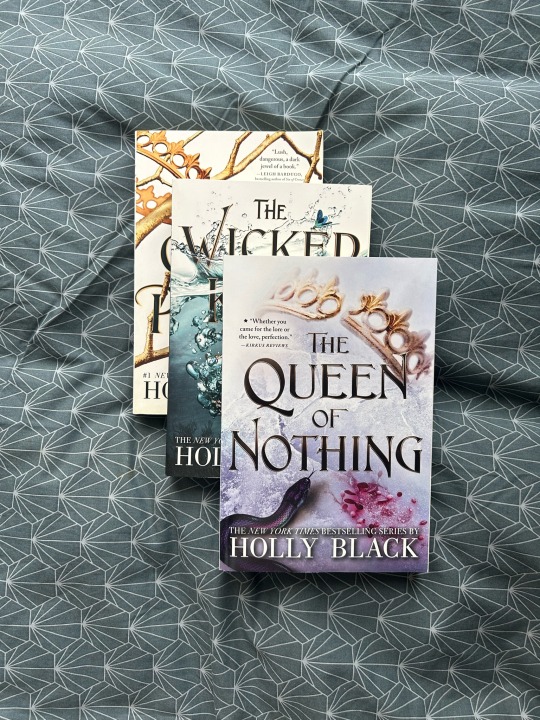
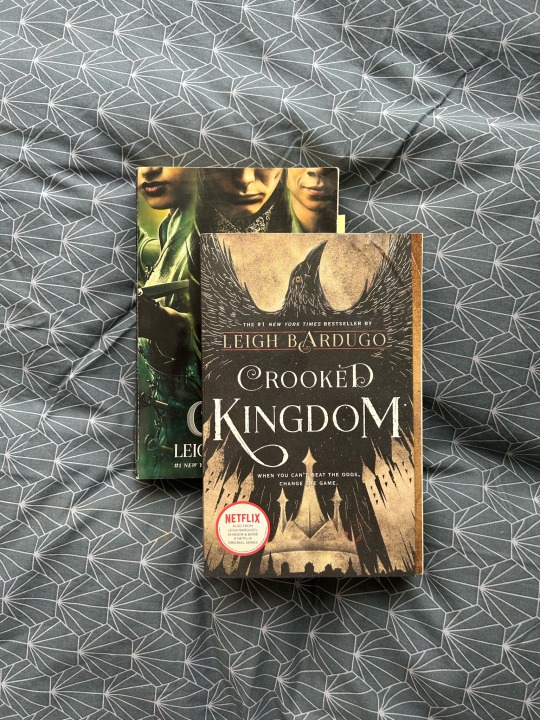
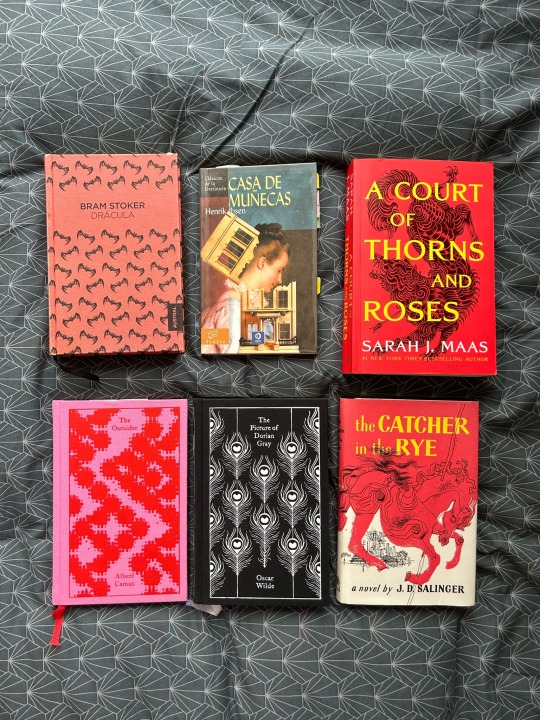
Reads of the year
Happy Place - Emily Henry
Book Lovers - Emily Henry
Beach Read - Emily Henry
Folk of the Air Trilogy - Holly Black
Six of Crows Duology - Leigh Bardugo
Dracula - Bram Stocker
Dollhouse - Henrik Ibsen
ACOTAR - Sarah J Maas
The Catcher in the Rye - J.D Salinger
The Outsider - Albert Camus
The Picture of Dorian Gray - Oscar Wilde
Not pictured: Haikyuu manga, AOT manga, Chasing the Boogeyman - Richard Chizmar, Babel - R F Kuang, Kingdom of the Wicked - Kerri Maniscalco
Overall an all over the place list of titles ngl, tackled 3 more classics for my checklist, read some cute contemporary romance as palate cleansers, finally read the Six of Crows duology while travelling at the beginning of the year, read the Folk of the Air trilogy, and reread some of my favourite books. I might do a recs post once I'm done with my tbr so give it or take next year. Might I add that I did enjoy every book I read this year, which is a really welcome surprise for some of these.
#studyblr#student#chiimipng#university#book#booklr#bookblr#books#bookworm#booklover#reading#dark academia#bookish#mybooks#chiimireview
10 notes
·
View notes
